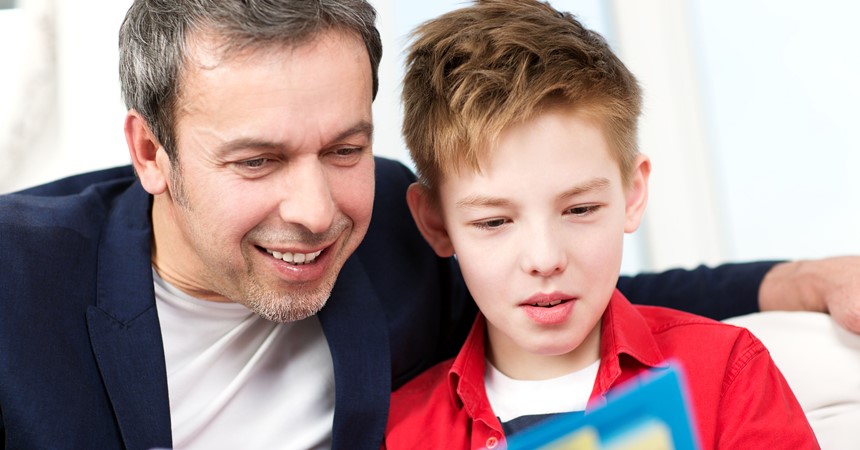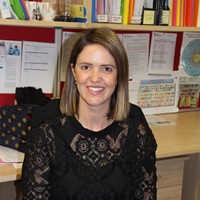It is only fitting that when discussing such a topic, we define what we are talking about. There are two important aspects of the word ‘vocabulary’: a) understanding the meaning of words - ‘receptive vocabulary’ and b) using a word correctly in speech or writing - ‘expressive vocabulary.’ Think back to when your child was not yet talking, but may have been able to follow little instructions such as “wave to Nanny”. This shows us that their receptive vocabulary was developing, but that they needed more time before they could express such words themselves.
Why is it important to understand the difference between receptive and expressive vocabulary? There is a delicate balance between overly simplifying how we talk to our children (using only words they already know and use) and using words that are too complicated (words they don’t understand and don’t use). Children are like little sponges who, over time and with frequent exposure, soak up words they hear first and then start using them themselves. Patience and repetition are key when helping your children move a word from their receptive to their expressive word bank.
It is difficult to fully appreciate the power of words in our adult lives, let alone their importance as a child learning to read or reading to learn. An abundance of research highlights the link between vocabulary and academic achievement. In The Report of the National Reading Panel (2000), teaching vocabulary was identified as an essential component of comprehensive literacy instruction. Try to imagine learning to ‘crack the code’ of written English while simultaneously attempting to comprehend the meaning of the word you are sounding out. Reduced vocabulary makes it very difficult to understand what you are reading – no matter what age you are.
This raises the important point – when do we stop learning new words? As a novice about to embark on the terrifying journey of house renovations, I am constantly ‘googling’ a long list of jargon from the architect and builder. Word learning is a life-long journey and as parents, your role in this learning does not cease when your child celebrates his or her 8th birthday. In fact, explicit teaching of vocabulary in secondary school is just as important as in pre-school.
Research articles show the variation in vocabulary between children of similar age. Research by Hart and Risley (1995) gave way to the phrase, the “30 Million Word Gap” (see table). Essentially, the results indicated that between one child and the next, there could be a difference of 30 million in terms of the words they have been exposed to in their first three years of life.
|
|
CHILD 1 |
CHILD 2 |
CHILD 3 |
|
NUMBER OF WORDS HEARD |
13 MILLION |
26 MILLION |
45 MILLION |
|
NUMBER OF QUESTIONS/HOUR |
5 |
20 |
40 |
|
AFFIRMATIONS |
5/11 |
12/7 |
32/5 |
|
NUMBER OF WORDS IN VOCABULARY |
2,000 |
12,000 |
20,000 |
|
We can reduce this gap by talking, reading, singing thirty minutes a day. |
|||
Unfortunately, vocabulary acquisition is very much susceptible to the ‘Matthews Effect’ – the more words your child understands, the more words s/he will be able to learn. The children who come to school with good vocabulary continue to make gains, while the gap between those and the children with a reduced knowledge of words grows every day.
How can I help my child?
There are no prizes for guessing that the primary way you can help your children develop their vocabulary is to talk to them. Some considerations for introducing words may include;
Step One: Give a child-friendly definition, eg “‘hilarious’ means something is really funny.” Sometimes this can be where the discussion stops. However, research suggests that between 10 and 30 exposures to a new word are required in order to confidently use it in our own speech, so keep at it!
Step Two: Relate the word to something in your child’s environment, eg “Remember when your sister ate a piece of lemon and pulled a funny face, it was hilarious!”
Step Three: Support your child to think of his/her own example, eg “Can you think of something else that was hilarious? Something that was so funny you couldn’t stop laughing?”
Step Four: Refer to the new word throughout the coming weeks.
Aside from narrating your daily activities, there are many other opportunities to develop vocabulary − in particular, reading to your child every day. When the classroom readers are sent home in Kindergarten, be careful that you are not only reading these. They are designed to help your child learn to decode written words. They are certainly not designed to expose them to exciting and interesting vocabulary – as you will no doubt discover. Try to find time to practise the ‘learn to read’ texts from school, while still spending time reading high interest books to your child. As your child grows older, s/he may be less happy about sitting and listening to you read aloud, so try exploring audiobooks and podcasts.
You can play a significant role in supporting your child to build a great vocabulary. If you would like some help or have concerns, please talk to your pre-school/classroom teacher who will be able to provide more individualised advice.
To share what you think of Aurora, complete survey here.























































































